Our outside directors gathered to discuss the roles they played in the formulation of the new medium-term management plan and on future challenges aimed at strengthening corporate governance.
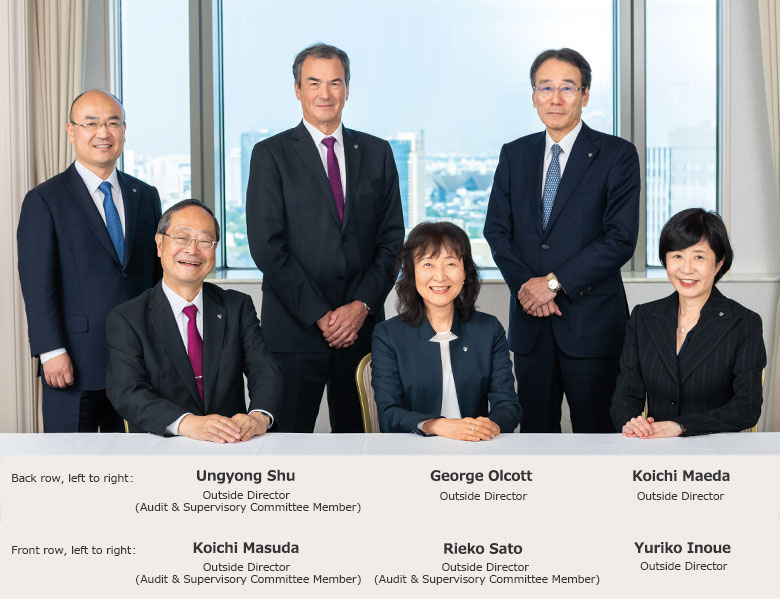
Outline of the Stakeholder Dialogue
| Theme | Enhancing the Effectiveness of Governance and Accelerating Growth Strategies |
|---|---|
| Stakeholder |
|
- *
The affiliation and position are at the time when the dialogue was held for producing Annual Report (published in August, 2018).
Assessment of the New Medium-term Management Plan CONNECT 2020
── As an outside director, how do you view the new medium-term management plan, CONNECT 2020, announced this spring?
Olcott First, I would like to praise the plan's formulation process. In many cases, top-level decision making at Japanese companies involves the execution side simply submitting a proposal to the Board of Directors for approval. However, for this medium-term management plan, deliberations involving the Board of Directors were held on two or three occasions from the drafting stage. The fact that I was able to participate in these discussions made me feel like I contributed to the decision-making process to some extent.
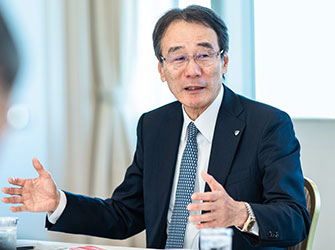
Maeda I agree. The draft plan was reviewed from various angles during the many discussions held from about one year prior to the finalization of the new medium-term management plan. Discussions were based on the overarching theme of growth strategies aimed at 2020. Ultimately, the plan was compiled after incorporating the views of us outside officers as well. I found this to be a valuable process as a means of formulating the plan.
Sato We really spent a long period of time discussing the plan. There were even meetings that convened only outside directors. In addition to Dai-ichi Life Holdings' outside directors, the outside officers of Dai-ichi Life were also asked to provide feedback. This led to discussions on the perspective needed for formulating the medium-term management plan.
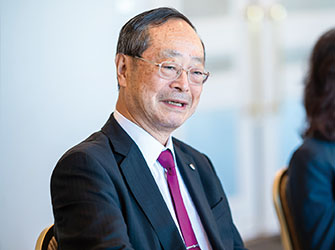
Masuda I was elected outside director after we transitioned to a holding company structure so I was very interested in how the medium-term management plan would be discussed under the new corporate structure as a company with an Audit & Supervisory Committee. As all of you have noted, the decision-making process used this time was extremely good. I was able to participate in fundamental talks such as whether to make it a three-year or five-year plan. Discussions revealed a great deal about the direction of the Dai-ichi Life Group and future challenges.
Maeda Since its demutualization, the Dai-ichi Life Group has laid out new axes of business aimed at moving to the next step. The previous medium-term management plan focused on building a foundation for the three growth engines built of domestic life insurance, overseas life insurance, and asset management. This time around, the plan positions us to achieve sustainable growth based on this foundation.
Shu Since its listing, the Dai-ichi Life Group has promoted a strategy of expanding from Japan into international markets. To continue implementing this strategy, it is important that we reinforce our domestic business. In other words, it is important that we maintain and expand the profitability of our domestic business autonomously. The new medium-term management plan also focuses on this aspect. I find it to be a plan carefully crafted based on this awareness.
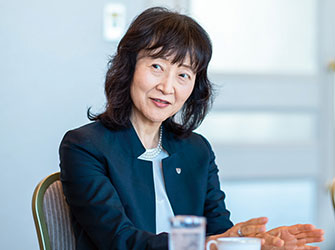
Sato I recall that the concept of the medium-term management plan known as CONNECT was presented from the execution side during the course of discussions. This word carries with it many meanings, such as connecting with customers using a customer-first approach, connecting with sales partners such as agencies and banks, and connecting with untapped customer segments. This word aptly expresses the aim of harnessing all the strengths of the Dai-ichi Life Group.
Shu I understand CONNECT to mean the act of solidifying the markets and management resources the Dai-ichi Life Group has established to date. The word CONNECT is the right word for stakeholders to understand our approach of re-utilizing the new experiences and know-how gained through previous strategies in new fields. This includes new resources gained from M&A of overseas companies and reaching new customer segments by diversifying our sales channels in the domestic market.
Inoue I was not directly involved in the formulation process because I was just appointed outside director this June, but before this I served on the Company's Advisory Board, and was shown a copy of the plan's original draft. The one aspect that caught my attention was that the new medium-term management plan aims to promote InsTech and create innovation through big data analysis and other means. The creation of an ecosystem that delivers benefits to both users and business partners alike, with a platform that utilizes data collected through collaboration with different sectors in various industries, represents a new convention of management strategy. I believe this approach has high affinity with the life insurance industry. For this reason, I have high hopes for the Dai-ichi Life Group's future initiatives.
Initiatives for Strengthening Corporate Governance
── Are you aware of any challenges facing the Dai-ichi Life Group in terms of corporate governance?
Olcott One challenge is the governance of overseas Group companies acquired through M&A. The Dai-ichi Life Group is growing at a quick pace globally. The life insurance business is tightly regulated in each country, which means sending experts from Japan to overseas business sites, which is a common practice in the manufacturing industry, is not effective. Overseas M&A ultimately means acquiring local companies, which results in organizations with completely different histories and cultures joining the group. This is why building a trusting relationship with the counterparty's management is a major challenge. For example, when Protective or TAL acquires a business locally, these businesses become a subsidiary of a subsidiary, but if they are unable to build trustworthy relationships, it will be difficult to entrust such a strategy to these new members of the Group. It is extremely important to create a "One Dai-ichi Life" where global talent is educated at the head office and newly acquired companies are given the opportunity to learn about the head office in Japan.
Sato The governance of overseas Group companies is an extremely challenging issue. Even when a trustworthy relationship is established with the counterparty's management at the time of an acquisition, there are other latent issues to consider, such as what will happen when a generational change occurs. In the case of Dai-ichi Life Holdings, we are aware of the intended successors of Group companies, so I think it's a matter of how we as outside directors support this process.
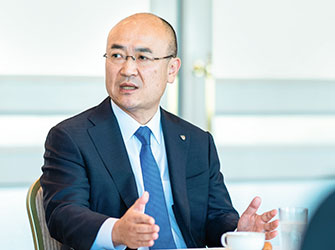
Shu There are many cases where a Japanese company takes a slow, step-by-step approach to post-merger integration in consideration of the other company's independence.
In the case of Dai-ichi Life Holdings, I feel like we are relatively better at building trustworthy relationships with the management of acquired companies because of the culture of the life insurance industry which values trust. Going forward, I think we should continue to take a quicker approach to post-merger integration and actively incorporate the management of acquired companies.
Maeda I have seen a number of business acquisitions over the years. I have found that Dai-ichi Life Holdings looks very carefully at the people and the target company, which why I believe M&A has been carried out well so far. Over the next three years, we will take the time to complete a new foundation by examining these deals from various perspectives. This includes the synergies produced in our core business using the business foundations acquired through M&A, linkages with new business creation, solutions that can be utilized mutually in Japan and overseas, implementation of governance, and utilizing the human capital of acquired companies globally.
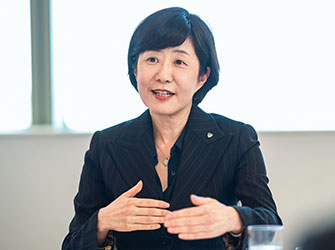
Inoue Changing subjects, from the perspective of board effectiveness, I feel it will be important to further enhance the diversity of the Board of Directors going forward. I don't have any experience in corporate management, but enhancing the board's diversity, including adding members without such experience, will make it possible to incorporate the perspectives of more stakeholders in management. On the other hand, for us to participate in the decision making process and provide effective advice, we need to deepen our understanding of the company's business and strategy.
Masuda The Dai-ichi Life Group provides multilayered and wide-ranging training programs. It also provides detailed documents and preliminary explanations, and regularly holds tours to foster understanding about the frontlines of its businesses. There are opportunities to speak with Total Life Plan Designers out in the field across Japan and visit overseas business sites, which is very informative.
Shu People inside the company build their career in the same culture and consider strategy along the lines of what has been the usual approach. This tends to result in discussions converging on the same direction. The ability to raise questions that may have not yet been considered is an essential role of outside directors.
Sato I agree. Speaking frankly about questions is meaningful because you can present a completely different, outside perspective to inside directors and the execution side.
Shu I would like to share another opinion. I feel it is necessary to have discussions from a longer term vantage point taking into account ESG and other perspectives. The life insurance business itself has high public profile. This is why ESG and CSR for the Dai-ichi Life Group involve continually generating profit in a sustainable manner using a legitimate approach. As the life insurance industry in Japan now faces a challenging environment, the Dai-ichi Life Group is working to quickly lay out new business axes such as developing new markets and new channels and making efforts amid a business environment that is becoming increasingly difficult. In order to continue to generate profit consistently in the future, it is important that disciplined discussions and decision making be carried out by the Board of Directors with regard to the selection of priority businesses and new initiatives.
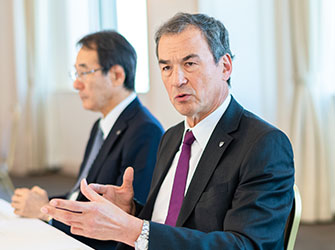
Olcott It is difficult to predict future environmental changes. This is why I feel it is important to think about what the global landscape will be like in 20 to 30 years' time and what business model the Dai-ichi Life Group will need to adopt in order to continue to grow. I would like for the Dai-ichi Life Group to develop growth scenarios based on a long-term vision and strive to realize those scenarios.